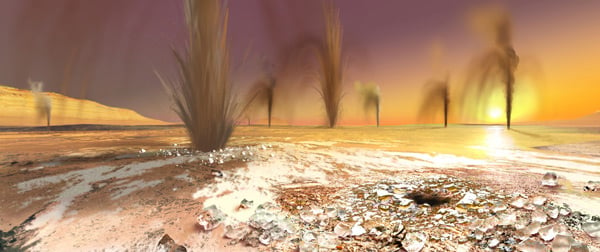This article is more than 1 year old
Martian pole freckled with geysers
Unlike anything on Earth
Every spring, the southern polar cap on Mars almost fizzes with carbon dioxide, as the surface is broken by hundreds of geysers throwing sand and dust hundreds of feet into the Martian "air".
The discovery was announced in the journal Nature by researchers at the Arizona State University, based on data from the Thermal Emission Imaging System on the Mars Odyssey orbiter.
Images sent back by the probe showed that as the sun began to warm the pole, the polar cap began to break out in dark spots. Over the days and weeks that followed, these spots formed fan-like markings, and spidery patterns. As the sun rose higher in the Martian sky, the spots and fans became more numerous.
"Originally, scientists thought the spots were patches of warm, bare ground exposed as the ice disappeared," said lead scientist Phil Christensen. "But observations made with THEMIS on NASA's Mars Odyssey orbiter told us the spots were nearly as cold as the carbon dioxide ice, which is at minus 198 degrees Fahrenheit."
The team concluded that the dark spots were in fact geysers, and the fans that appeared were caused by the debris from the eruptions.

Christensen said: "If you were there, you'd be standing on a slab of carbon-dioxide ice. Looking down, you would see dark ground below the three foot thick ice layer.
"The ice slab you're standing on is levitated above the ground by the pressure of gas at the base of the ice."
He explains that as the sunlight hits the region in the spring, it warms the dark ground enough that the ice touching the ground is vaporised. The gas builds up under the ice until it is highly pressurised and finally breaks through the surface layer.
As the gas escapes, it carries the smaller, finer particles of the soil along with it, forming grooves under the ice. This "spider" effect indicates a spot where a geyser is established, and will form again the following year. ®
